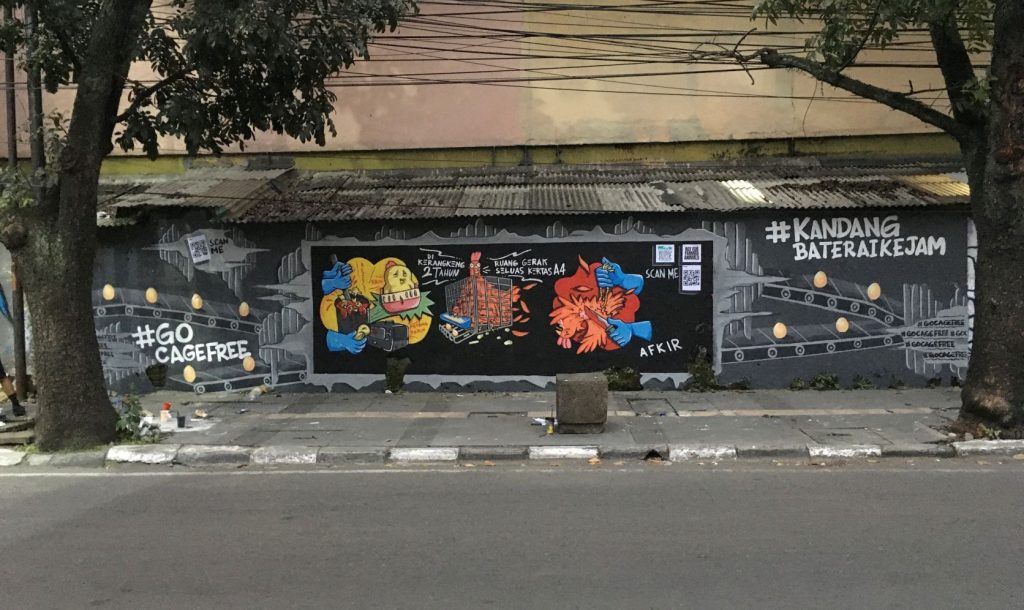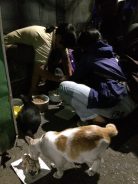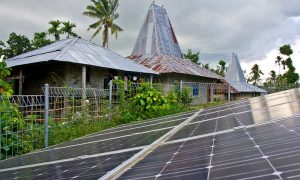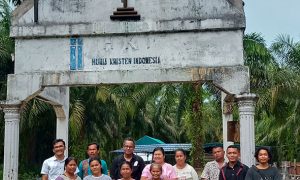In February this year, murals appeared across Indonesia depicting the appalling living conditions of layer hens in battery cages. The message was strengthened by a concurrent action in which educational posters were pasted up in public spaces across the cities.
Animal Friends Jogja (AFJ) along with Act For Farmed Animals (AFFA) collaborated with mural artists and Barisan Muda-Mudi Xayang Xatwa (BMXX) and AFJ volunteers for the Farmed Animal Campaign in seven major Indonesian cities, including Medan and Palembang on Sumatra, Jakarta, Bandung, Yogyakarta, and Surabaya on Java Island and Denpasar on Bali.
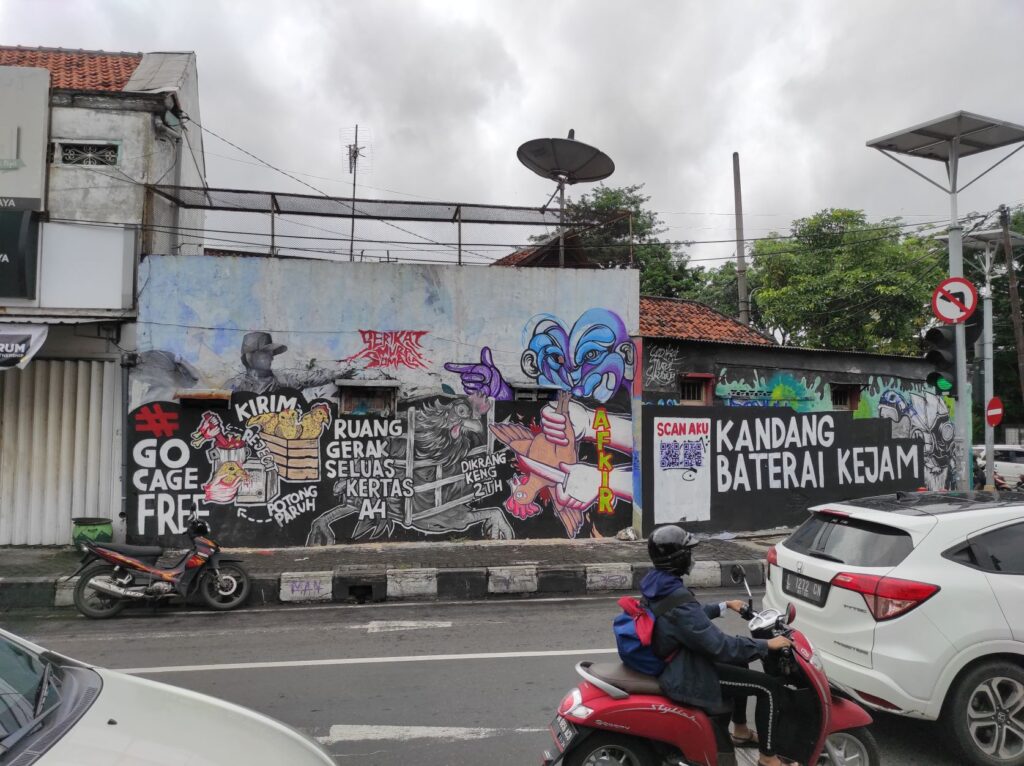
A #gocagefree campaign mural in Surabaya. Image supplied.
The murals and posters include QR codes asking the public to sign petitions asking for two global food companies, McDonald’s and A&W, to make commitments to source only cage-free egg products in their supply chains. The campaign is aimed at gaining public awareness on the cruelty of the battery cage system for layer hens and encouraging corporate commitment to do cage-free farming.
“In Indonesia, many forms of street art (murals, posters, wheat pasting, stenciling, graffiti, etc.) are bringing political, social, and humanitarian issues to light. Still, for some reason, few of them give voice to the injustice faced by animals, including animals exploited in the farming industry,” explained Xgo, from Serikat Mural Surabaya.
The true story of cruelty to animals in Indonesia
The ABC should establish a new relationship with an Indonesian partner, enabling Australians to learn that this humane cause is shared by our close neighbours.
The use of battery cages itself has been prohibited in several countries and regions, including Switzerland, the European Union, Bhutan, and many regions of the Americas. However, according to the UN Food and Agriculture Organization (FAO), this cruel system still dominates the animal farming sector in Indonesia, with more than 260 million layer hens suffering in narrow battery cages, living for years in a space less than the size of a piece of A4 paper. This system doesn’t allow the hens access to most of the natural behaviors that are essential for their welfare, such as perching, nesting to lay eggs, dust bathing, not to mention scavenging in soil, and exploring.
“The idea that battery cages are cruel is still a very new concept for many people here, and to see chickens caged inside small cages is considered normal. AFJ’s campaign has opened our eyes to their suffering,” explained Ruru, the artist who coordinated the mural in Palembang. “Through the mural that we made, we hope that people can be educated about what they consume and that they will be more concerned about animal welfare,” Ruru continued.
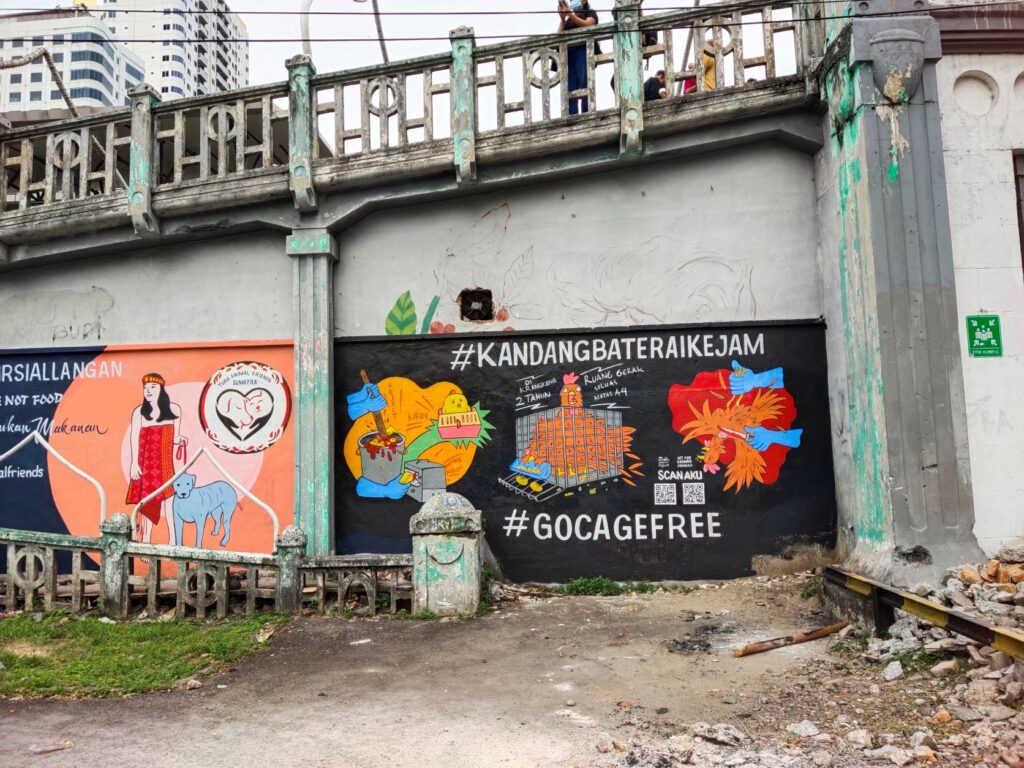
A #gocagefree campaign mural in Medan. Image supplied.
Two large multinational companies that have committed to a cage-free policy are Yum! Brands and Focus Brands. These corporate giants are parent companies for various famous fast-food company brands. At the end of 2021, they globally committed to end the use of hen eggs sourced from battery cage farms across their global supply chain. The commitment was made after a campaign was launched against them by Open Wing Alliance, a coalition of animal protection organizations from around the world, including AFJ. This success is also closely linked to the public support of consumers who care about animal welfare and demand better standards.
This significant success—changing the policies of big food companies to no longer accept eggs from hens in battery cage systems—is expected to open the gate for global change. In Indonesia, the change is already happening with several local and national food sector businesses based in Yogyakarta, which have also committed to a cage-free policy in their supply chain after discussions with AFJ. These include Chocolate Monggo, Mediterranea Restaurant, Kebun Roti Artisan Bakery, ViaVia Artisan Bakery, Yabbiekayu Restaurant and Eco Villas, Bumi Langit Restaurant, and Blue Steps Villa & Resto, with interest in joining the campaign from other businesses building daily.
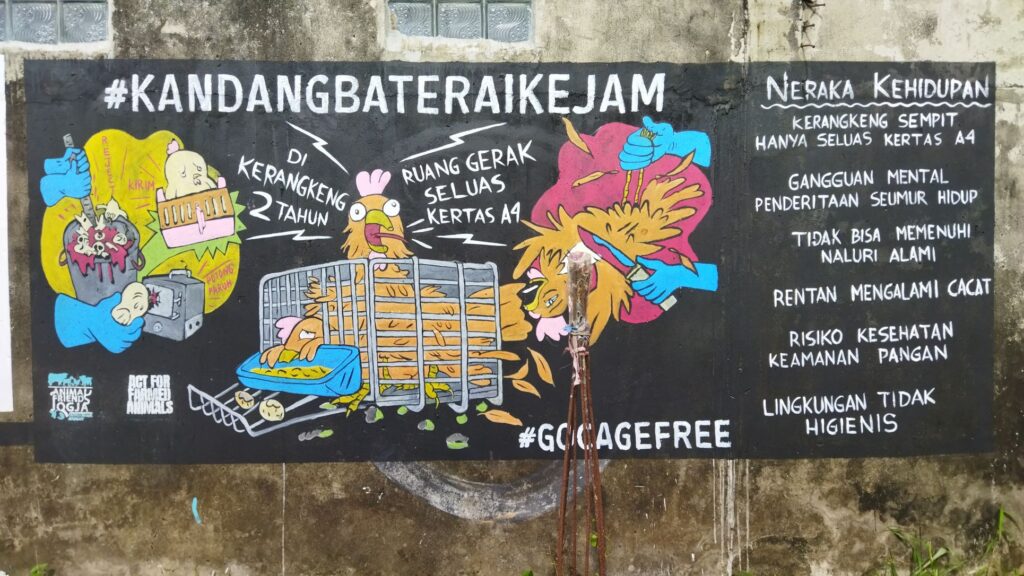
A #gocagefree campaign mural in Palembang. Image supplied.
The urgency to stop the use of battery cages is also linked to human health issues. A comprehensive study concerning food safety by European Food Safety Authority/EFSA) about the comparison of salmonella contamination in the battery cage vs. cage-free systems concluded that the salmonella contamination in the battery cage system is higher than the free-cage system.
“Aside from ignoring animal welfare principles, the intensive farming system for this type of egg production also risks our health. It’s time for us to accept the facts and try to apply a cage-free policy that will protect both the animals from extreme cruelty and people’s health,” Elly concluded.
Act for Farmed Animals (AFFA) is a joint campaign run by Animal Friends Jogja and Sinergia Animal to increase animal welfare in Indonesia.
 Facebook
Facebook  Twitter
Twitter  Soundcloud
Soundcloud  Youtube
Youtube  Rss
Rss 